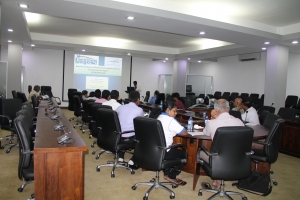MFF SGF Phase 2 Cycle 4 Grantees share their lessons
Location: Colombo, Sri Lanka . 23rd Oct 2015
Project grantees presented the results, informative observations, lessons learnt and constraints and the remedies adopted. Three members of the MFF National Steering Committee, including the Chairman of the MFF Technical Sub-committee participated in addition to the Country Representative of IUCN Sri Lanka and key staff on MFF.
The project on Developing Socio-ecological Profile of the Jaffna Lagoon implemented by the Department of Chemistry, University of Jaffna revealed anthropogenic activities such as dumping of household wastes in coastal areas of the lagoon, agricultural and urban runoff and discharge of inadequately treated effluent from the nearby hospital sewage treatment plant and storm water runoff diverted directly into the Jaffna lagoon, have negatively affected the lagoon water quality.
While Field / Society oriented research interest has been developed among the undergraduates, the researchers indicated that as a continuance of the socio-ecological study in the Jaffna Lagoon, regular monitoring of all lagoons in the Northern part of Sri Lanka should be instituted. This could be helpful to identify point sources of pollution that contaminate lagoon ecosystems and develop/amend appropriate criteria and standards for discharge of effluents into the lagoon.
The results highlighted the immediate need to implement a proper wastewater and solid waste management scheme and manage the discharges to the lagoon system to protect the ecosystem. In addition roads constructed by partitioning the wetland are found to be inappropriate and instead overhead bridges are considered as appropriate to ensure sustainable future fishery production.
The main lesson learned from the project on Value of Ecosystems’ Services Provided by the Jaffna Lagoon implemented by Hector Kobbekaduwa Agrarian Research and Training Institute (HARTI) was the immediate need to study the carrying capacity of the lagoon and advise the policy makers accordingly.
The most important lesson learned from project on Participatory Conservation of the Casuarina Forest Belt in Manalkadu Sand Dunes implemented by Aaruthal Sri Lanka was when selecting members for the Forest User Group (FUG) - the custodian of the forest, provision to incorporate members who can spend more time for this task should have been considered during the formation of FUG.
Alternative Livelihood to the Women in Delft Fisher Community implemented by Sevalanka Foundation with 40 women preparing low salted dry fish using a new method revealed that the quality of packing and branding are factors which should be considered to attract the customer.
The lessons learnt from the project, Analysis of Development Options for Thondamannaru Lagoon implemented by the Department of Zoology, University of Jaffna were on project management aspects. The MFF formats on activity-based budget had helped the researchers to keep a tab on the project expenses while monthly finance and quarterly technical and finance reporting helped them know “where they were”.
These study results were presented to the Northern Provincial Council members early this year and the discussion helped to transfer key points to the provincial and district level planning related to lagoon land use including the ideas towards reviewing the proposal to make the “Thondarmanaru Lagoon” a fresh water lagoon.

MFF SGF Cycle 4 Lessons learnt workshop , Colombo © Kumudini Ekaratne , 2015